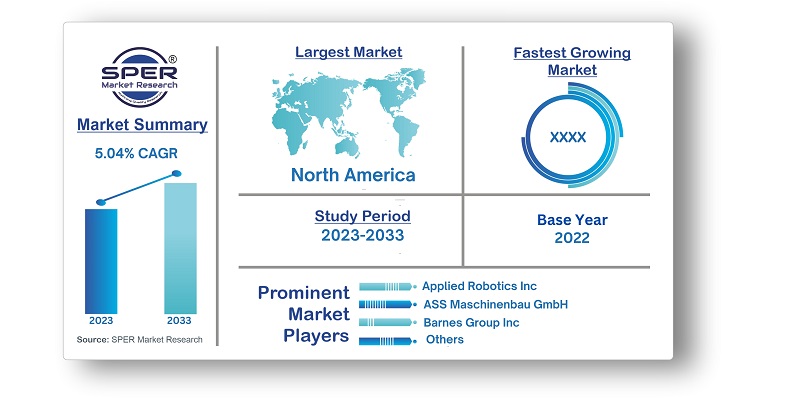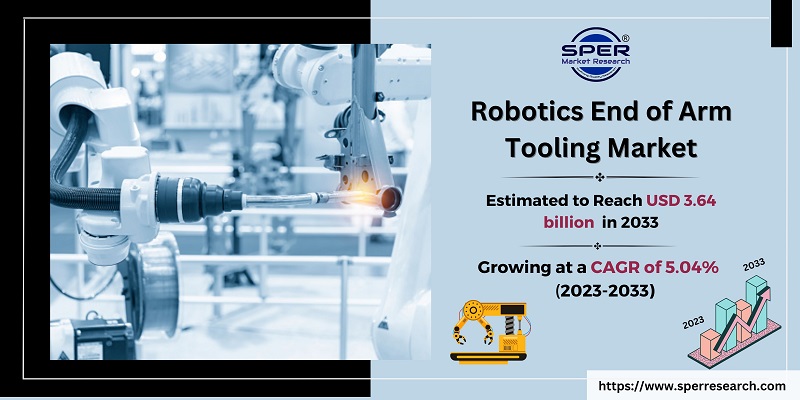
Robotics End of Arm Tooling Market Growth, Trends, Size, Challenges and Future Outlook
Robotics End of Arm Tooling Market Size- By Product Type, By End Use Industry, By Application- Regional Outlook, Competitive Strategies and Segment Forecast to 2033
| Published: May-2023 | Report ID: IACT23110 | Pages: 1 - 224 | Formats*: |
| Category : Information & Communications Technology | |||


| Report Metric | Details |
| Market size available for years | 2019-2033 |
| Base year considered | 2022 |
| Forecast period | 2023-2033 |
| Segments covered | By Product Type, By End-Use Industry, By Application, |
| Regions covered | Asia-Pacific, Europe, Middle East and Africa, North America, Latin America |
| Companies Covered | Applied Robotics Inc., ASS Maschinenbau GmbH, Barnes Group Inc., Dover Corp., EMI Corp., EMI Corp., Festo SE and Co. KG, FIPA GmbH, IPR GmbH, Novanta Inc., Toyota Industries Corp., Others |
- Industrial Manufacturers
- Robotic System Integrators
- Automation Solution Providers
- Original Equipment Manufacturers (OEMs)
- End-User Industries
- Global Robotics End Of Arm Tooling Market Value Share and Forecast, By Product Type, 2023-2033
- Grippers
- Welding Torches
- Material Removal Torches
- Tool Changer
- Global Robotics End Of Arm Tooling Market Value Share and Forecast, By End-Use Industry, 2023-2033
- Automotive & Transportation
- Electronic & Semiconductors
- Food & Beverage
- Chemical & Pharmaceutical
- Logistics
- Healthcare
- Other
- Global Robotics End Of Arm Tooling Market Value Share and Forecast, By Application, 2023-2033
- Assembly Line
- Material Handling
- Welding Process
- Packaging Line
- Painting Line
- Inspection Line
- Asia-Pacific
- Europe
- Middle East & Africa
- North America
- Latin America
- Global Robotics End Of Arm Tooling Market Size (FY’2023-FY’2033)
- Overview of Global Robotics End Of Arm Tooling Market
- Segmentation of Global Robotics End Of Arm Tooling Market By Product Type (Grippers, Welding Torches, Material Removal Torches, Tool Changer)
- Segmentation of Global Robotics End Of Arm Tooling Market By End-Use Industry (Automotive & Transportation, Electronic & Semiconductors, Food & Beverage, Chemical & Pharmaceutical, Logistics, Healthcare)
- Segmentation of Global Robotics End Of Arm Tooling Market By Application (Assembly Line, Material Handling, Welding Process, Packaging Line, Painting Line, Inspection Line)
- Statistical Snap of Global Robotics End Of Arm Tooling Market
- Growth Analysis of Global Robotics End Of Arm Tooling Market
- Problems and Challenges in Global Robotics End Of Arm Tooling Market
- Competitive Landscape in the Global Robotics End Of Arm Tooling Market
- Impact of COVID-19 and Demonetization on Global Robotics End Of Arm Tooling Market
- Details on Recent Investment in Global Robotics End Of Arm Tooling Market
- Competitive Analysis of Global Robotics End Of Arm Tooling Market
- Key Players in the Global Robotics End Of Arm Tooling Market
- SWOT Analysis of Global Robotics End Of Arm Tooling Market
- Global Robotics End Of Arm Tooling Market Future Outlook and Projections (FY’2023-FY’2033)
- Recommendations from Analyst
1.1. Scope of the report1.2. Market segment analysis
2.1. Research data source2.1.1. Secondary Data2.1.2. Primary Data2.1.3. SPER’s internal database2.1.4. Premium insight from KOL’s2.2. Market size estimation2.2.1. Top-down and Bottom-up approach2.3. Data triangulation
4.1. Driver, Restraint, Opportunity and Challenges analysis4.1.1. Drivers4.1.2. Restraints4.1.3. Opportunities4.1.4. Challenges4.2. COVID-19 Impacts of the Global Robotics End Of Arm Tooling Market
5.1. SWOT Analysis5.1.1. Strengths5.1.2. Weaknesses5.1.3. Opportunities5.1.4. Threats5.2. PESTEL Analysis5.2.1. Political Landscape5.2.2. Economic Landscape5.2.3. Social Landscape5.2.4. Technological Landscape5.2.5. Environmental Landscape5.2.6. Legal Landscape5.3. PORTER’s Five Forces5.3.1. Bargaining power of suppliers5.3.2. Bargaining power of buyers5.3.3. Threat of Substitute5.3.4. Threat of new entrant5.3.5. Competitive rivalry5.4. Heat Map Analysis
6.1. Global Robotics End Of Arm Tooling Market Manufacturing Base Distribution, Sales Area, Product Type6.2. Mergers & Acquisitions, Partnerships, Product Launch, and Collaboration in Global Robotics End Of Arm Tooling Market
7.1. Global Robotics End Of Arm Tooling Market Value Share and Forecast, By Product Type, 2023-20337.2. Grippers7.3. Welding Torches7.4. Material Removal Torches7.5. Tool Changer7.6. Others
8.1. Global Robotics End Of Arm Tooling Market Value Share and Forecast, By End-Use Industry, 2023-20338.2. Automotive & Transportation8.3. Electronic & Semiconductors8.4. Food & Beverage8.5. Chemical & Pharmaceutical8.6. Logistics8.7. Healthcare8.8. Other
9.1. Global Robotics End Of Arm Tooling Market Value Share and Forecast, By Application, 2023-20339.2. Assembly Line9.3. Material Handling9.4. Welding Process9.5. Packaging Line9.6. Painting Line9.7. Inspection Line
10.1. Global Robotics End Of Arm Tooling Market Size and Market Share
11.1. Global Robotics End Of Arm Tooling Market Size and Market Share By Product Type (2019-2026)11.2. Global Robotics End Of Arm Tooling Market Size and Market Share By Product Type (2027-2033)
12.1. Global Robotics End Of Arm Tooling Market Size and Market Share By End-Use Industry (2019-2026)12.2. Global Robotics End Of Arm Tooling Market Size and Market Share By End-Use Industry (2027-2033)
13.1. Global Robotics End Of Arm Tooling Market Size and Market Share By Application (2019-2026)13.2. Global Robotics End Of Arm Tooling Market Size and Market Share By Application (2027-2033)
14.1. Global Robotics End Of Arm Tooling Market Size and Market Share By Region (2019-2026)14.2. Global Robotics End Of Arm Tooling Market Size and Market Share By Region (2027-2033)14.3. Asia-Pacific14.3.1. Australia14.3.2. China14.3.3. India14.3.4. Japan14.3.5. South Korea14.3.6. Rest of Asia-Pacific14.4. Europe14.4.1. France14.4.2. Germany14.4.3. Italy14.4.4. Spain14.4.5. United Kingdom14.4.6. Rest of Europe14.5. Middle East and Africa14.5.1. Kingdom of Saudi Arabia14.5.2. United Arab Emirates14.5.3. Rest of Middle East & Africa14.6. North America14.6.1. Canada14.6.2. Mexico14.6.3. United States14.7. Latin America14.7.1. Argentina14.7.2. Brazil14.7.3. Rest of Latin America
15.1. Applied Robotics Inc.15.1.1. Company details15.1.2. Financial outlook15.1.3. Product summary15.1.4. Recent developments15.2. ASS Maschinenbau GmbH15.2.1. Company details15.2.2. Financial outlook15.2.3. Product summary15.2.4. Recent developments15.3. Barnes Group Inc.15.3.1. Company details15.3.2. Financial outlook15.3.3. Product summary15.3.4. Recent developments15.4. Dover Corp.15.4.1. Company details15.4.2. Financial outlook15.4.3. Product summary15.4.4. Recent developments15.5. EMI Corp.15.5.1. Company details15.5.2. Financial outlook15.5.3. Product summary15.5.4. Recent developments15.6. Festo SE and Co. KG15.6.1. Company details15.6.2. Financial outlook15.6.3. Product summary15.6.4. Recent developments15.7. FIPA GmbH15.7.1. Company details15.7.2. Financial outlook15.7.3. Product summary15.7.4. Recent developments15.8. IPR GmbH15.8.1. Company details15.8.2. Financial outlook15.8.3. Product summary15.8.4. Recent developments15.9. Novanta Inc.15.9.1. Company details15.9.2. Financial outlook15.9.3. Product summary15.9.4. Recent developments15.10. Toyota Industries Corp.15.10.1. Company details15.10.2. Financial outlook15.10.3. Product summary15.10.4. Recent developments15.11. Others
SPER Market Research’s methodology uses great emphasis on primary research to ensure that the market intelligence insights are up to date, reliable and accurate. Primary interviews are done with players involved in each phase of a supply chain to analyze the market forecasting. The secondary research method is used to help you fully understand how the future markets and the spending patterns look likes.
The report is based on in-depth qualitative and quantitative analysis of the Product Market. The quantitative analysis involves the application of various projection and sampling techniques. The qualitative analysis involves primary interviews, surveys, and vendor briefings. The data gathered as a result of these processes are validated through experts opinion. Our research methodology entails an ideal mixture of primary and secondary initiatives.



Frequently Asked Questions About This Report
PLACE AN ORDER
Year End Discount
Sample Report
Pre-Purchase Inquiry
NEED CUSTOMIZATION?
Request CustomizationCALL OR EMAIL US
100% Secure Payment






Related Reports
Our Global Clients
Our data-driven insights have influenced the strategy of 200+ reputed companies across the globe.




















